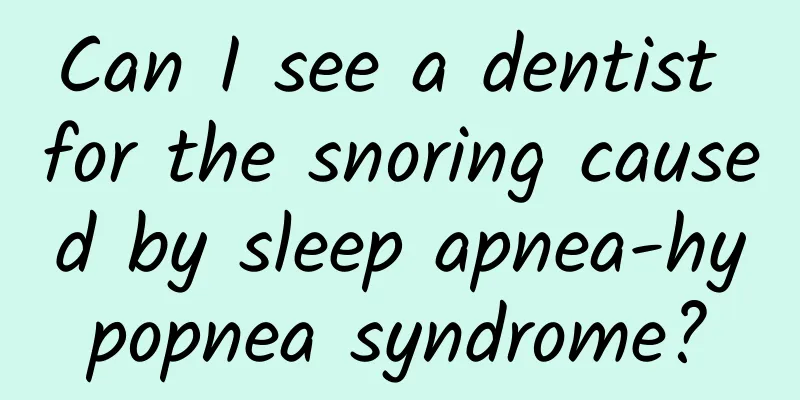Can I see a dentist for the snoring caused by sleep apnea-hypopnea syndrome?

|
Author: Huang Huiping, deputy chief nurse, Peking University School of Stomatology Reviewer: Gao Xuemei, Chief Physician, Peking University School of Stomatology It is reported that 150 million people in China are used to snoring when they sleep (commonly known as "snoring"). Especially when people lie down after drinking, the muscles of the uvula, tongue root, etc. tend to become loose and droopy, obstructing the respiratory airflow, and forming airflow turbulence and soft tissue vibration in the narrow upper respiratory tract, causing snoring. If an adult's apnea events do not exceed 5 times/hour when sleeping at night, and temporary snoring occurs due to fatigue, colds, nasal congestion, etc., the danger may not be too great; but if there are more than 30 apnea events throughout the night or more than 5 times/hour, and each episode stops the airflow from the mouth and nose for at least 10 seconds, it is sleep apnea hypopnea syndrome (OSAHS). Clinically, there are five groups of people who are prone to sleep apnea-hypopnea syndrome: ① obese people; ② patients with space-occupying lesions in the nose and nasopharynx; ③ older men; ④ patients with hypothyroidism and other diseases; ⑤ people with a small and retracted mandible. The common symptoms of sleep apnea-hypopnea syndrome are snoring during sleep, varying durations of apnea intervals during sleep, and possible sudden awakening during sleep. After waking up in the morning, you will experience fatigue, dry and bitter mouth, sometimes headaches, daytime sleepiness, changes in attention, memory, and personality, and may even affect the heart and blood pressure, as well as sugar metabolism disorders. If you feel that you have the above symptoms or feel that you have sleep apnea-hypopnea syndrome, you can go to a sleep center for relevant examinations, such as polysomnography. There are four main treatments for sleep apnea hypopnea syndrome: 1. ENT surgery; 2. Continuous positive airway pressure (wearing a ventilator to sleep at night); 3. Maxillofacial surgery; 4. Orthodontic oral appliance treatment. The fourth method is introduced below. During childhood and adolescence, the body grows rapidly, and oral appliances are mainly used to adjust bone structure and intervene in bad oral habits. Once children and adolescents stop breathing during sleep at night, they will not be energetic during the day, cannot concentrate when studying, and always fall asleep. Oral appliances can alleviate the condition by expanding the maxillary arch and inducing mandibular growth. Oral appliances are also called snoring devices in adults. They mainly move the mandible and tongue root forward, lower the soft palate with the level of the back of the tongue, enlarge the posterior airway of the oropharynx, reduce snoring, and reduce the incidence of sleep apnea. There are many types of snoring devices, which are non-surgical treatment methods in the Department of Orthodontics. They are suitable for patients with snoring and mild to moderate sleep apnea-hypopnea syndrome, as well as patients with severe sleep apnea-hypopnea syndrome who cannot tolerate ventilator treatment and surgery. They are inexpensive and less painful. Figure 1 An adult snoring device Copyright image, no reproduction is authorized When patients start wearing the anti-snoring device, they may feel soreness in the upper and lower jaw muscles. Most patients gradually adapt after 2 to 3 days. In the early stage, oral secretions may increase, and you can prepare a towel to wipe the saliva. In addition, the anti-snoring device should be well protected to prevent deformation. When the patient gets up early during the wearing period, the anti-snoring device can be taken off and cleaned with a toothbrush, and kept away from high temperature and sunlight to prevent premature aging. It should be noted that the anti-snoring device needs to be followed up according to changes in the condition and remade if necessary. If sleep apnea hypopnea syndrome occurs in middle-aged, elderly and obese people, lifestyle adjustment is very important. Patients should quit drinking and smoking, exercise more, lose weight, and keep their nasal cavity open. It is worth mentioning that patients with sleep apnea hypopnea syndrome should use sedatives and sleeping pills with caution, because some drugs can inhibit the respiratory center, which will aggravate apnea and snoring to a certain extent. In addition, people who like to sleep on their backs are also prone to snoring. It is recommended to sleep on your side to prevent pharyngeal tissue and tongue from blocking the airway and causing snoring. |
<<: What factors are related to overbite in children?
>>: Ipalrestat cannot lower blood sugar, but many diabetics are using it. Why?
Recommend
0 sugar 0 calorie beverage, drink as much as you want without getting fat?
How many calories are in a 500ml bottle of Fat Ho...
Can I eat kiwi fruit during menstruation?
Kiwi fruit has a cool nature, and when we eat kiw...
I always want to poop during my period but can't
After your period, you want to defecate but can&#...
What to do if a pregnant woman has bleeding stool
Pregnancy will bring various symptoms. Some sympt...
What causes gynecological inflammation in women?
Gynecological diseases have become a disease that...
Women have many pain points during menstruation, these methods can help you eliminate them all!
Generally speaking, most women will experience so...
Why can't I get pregnant after one year of intercourse?
It is a very happy thing for a couple to conceive...
Is it necessary to check for biliary atresia before pregnancy?
Before preparing to get pregnant, both men and wo...
How does a tiny virus with a diameter of less than 120 nanometers carry out its "T cell attack plan" in the human body?
On June 5, 1981, the U.S. Centers for Disease Con...
Can I swim while wearing a tampon during my period?
Swimming freely in the water is something that ma...
What should I eat to enlarge my breasts?
In modern society, people pay more attention to p...
The benefits of eating bee pollen for women
Pure honey is a healthy food that everyone is ver...
What to do if there is blood in the leucorrhea
Leucorrhea is very common and every woman will ha...
What causes bleeding during sex in women?
People take bleeding during sexual intercourse in...









